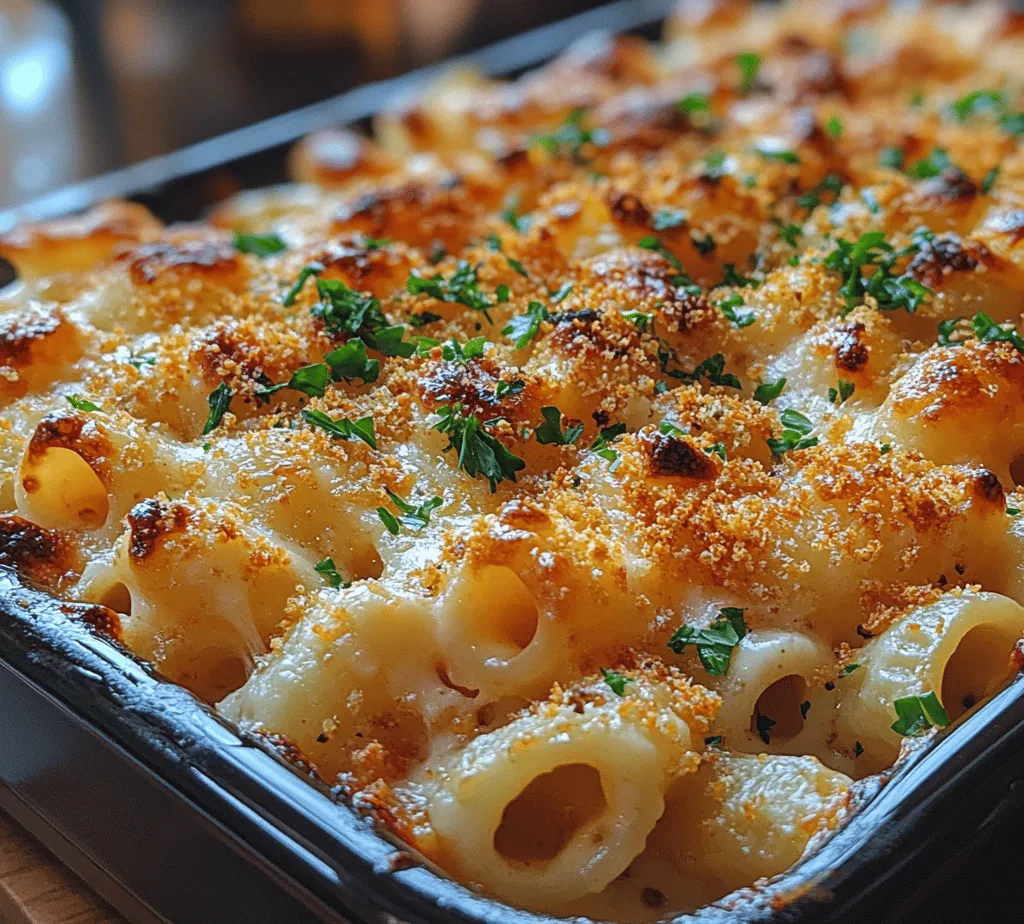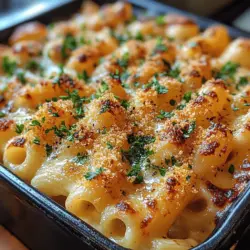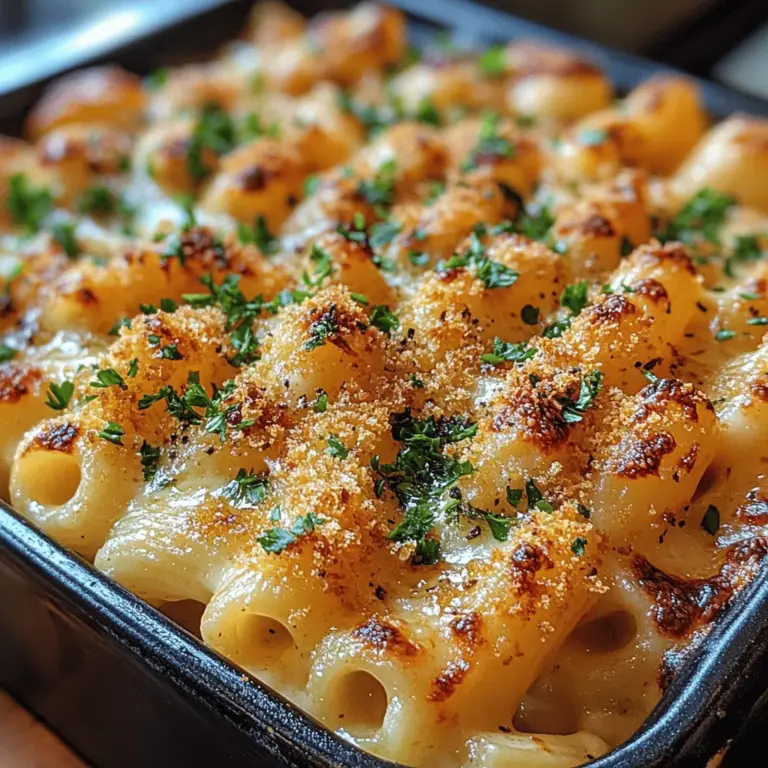Introduction
When it comes to comfort food, few dishes can evoke the same warm, nostalgic feelings as a steaming bowl of baked mac and cheese. This beloved dish has become a staple in homes across America, celebrated for its rich, creamy texture and indulgent flavors. It’s a dish that transports us back to childhood, often associated with family gatherings, potlucks, and cozy nights in. At its core, baked mac and cheese represents more than just a meal; it embodies comfort, warmth, and the simple joys of home cooking.
Baked mac and cheese holds a special place in American cuisine, tracing its roots back to the early days of colonization. While pasta and cheese dishes have been enjoyed in various forms for centuries, the baked version we know and love today began to gain popularity in the United States in the 18th and 19th centuries. Over the years, chefs and home cooks alike have put their own spin on this classic dish, experimenting with different cheeses, spices, and toppings to create unique variations.
What makes this recipe for baked mac and cheese stand out is its thoughtfully curated blend of cheeses, aromatic spices, and a perfectly crispy topping that elevates it from simple to extraordinary. This dish features a combination of sharp cheddar and Gruyère, providing a delightful balance of tanginess and nuttiness. The addition of spices like garlic powder, onion powder, and smoked paprika enhances the flavor profile, creating a depth that is simply irresistible. Topped with golden, crunchy panko breadcrumbs, this baked mac and cheese truly is the ultimate comfort food.
In this article, we aim to provide you with a comprehensive guide to making the ultimate baked mac and cheese. From understanding the essential ingredients to step-by-step instructions, we’ll ensure that you have all the tools you need to recreate this classic dish in your own kitchen. So, let’s dive in and discover what makes this baked mac and cheese so special.
Understanding the Ingredients
To create the ultimate baked mac and cheese, it’s essential to understand the role each ingredient plays in building flavor and texture. Below, we’ll break down the key components that come together to make this dish a true standout.
Elbow Macaroni
The first ingredient you’ll need is elbow macaroni, which is the classic pasta choice for this beloved dish. Its small, tubular shape allows it to hold onto the creamy cheese sauce beautifully, ensuring that each bite is packed with flavor. When selecting your pasta, look for high-quality options made from durum wheat for the best texture and taste. You want your macaroni to be cooked to an al dente consistency, which means it should have a slight bite to it even after baking. This helps the pasta maintain its shape and prevents it from becoming mushy in the oven.
Unsalted Butter and All-Purpose Flour
To achieve the rich, creamy cheese sauce that defines baked mac and cheese, you’ll need unsalted butter and all-purpose flour to create a roux. The roux acts as a thickening agent for the sauce, providing a smooth and velvety texture. Using unsalted butter allows you to control the saltiness of the dish, which is crucial when balancing the flavors of the cheese and other seasonings.
Whole Milk
Whole milk is the foundation of the cheese sauce, contributing to its creaminess and richness. When combined with the roux, it creates a luscious base that coats the pasta beautifully. For an even creamier sauce, consider using half-and-half or a combination of milk and cream. The goal here is to achieve a silky consistency that clings to the pasta without being overly watery.
Cheese Selection
Cheese is the star of any baked mac and cheese recipe, and selecting the right varieties is key to achieving the perfect flavor profile. Sharp cheddar is a popular choice due to its tangy flavor, which pairs well with the creaminess of the sauce. Gruyère cheese, on the other hand, adds a nutty, slightly sweet taste that elevates the dish to a gourmet level. The combination of these two cheeses creates a harmonious balance that is both satisfying and indulgent.
Feel free to experiment with other cheeses as well, such as mozzarella for stretchiness or fontina for added creaminess. Just remember that the total amount of cheese should be around 2 to 3 cups to ensure a rich and cheesy result.
Seasoning
Seasoning is an essential element of any dish, and baked mac and cheese is no exception. A blend of garlic powder, onion powder, mustard powder, and smoked paprika adds depth and complexity to the cheese sauce. Garlic and onion powders provide savory notes, enhancing the overall flavor without overpowering the cheese. Mustard powder adds a subtle tang that complements the richness of the cheese, while smoked paprika introduces a hint of smokiness that rounds out the dish beautifully.
Panko Breadcrumbs
To achieve that irresistible crunchy topping, panko breadcrumbs are your best friend. Unlike traditional breadcrumbs, panko is made from crustless bread and has a lighter, airier texture, resulting in a crispier finish when baked. Mixing the panko with a touch of olive oil ensures that it browns evenly and adds a delightful crunch that contrasts perfectly with the creamy mac and cheese underneath.
Olive Oil
In addition to enhancing the texture of the breadcrumbs, olive oil contributes a subtle fruity flavor that complements the other ingredients. Drizzling a little olive oil over the panko before baking ensures that it becomes golden and crispy, adding an extra layer of deliciousness to the dish.
Fresh Parsley
Finally, fresh parsley serves as a finishing touch that brightens the dish and adds a pop of color. Not only does it enhance the presentation, but it also provides a fresh, herbal note that balances the richness of the cheese. When you’re ready to serve your baked mac and cheese, sprinkle some chopped fresh parsley on top for an appealing and flavorful garnish.
Step-by-Step Instructions
Now that we’ve covered the essential ingredients, let’s move on to the step-by-step process of making the ultimate baked mac and cheese. Follow these detailed instructions to ensure that your dish turns out perfectly every time.
Cooking the Pasta
Begin by cooking the elbow macaroni. The key to achieving the right texture is to cook the pasta until it is al dente, which means it should be tender but still firm to the bite. This is important because the pasta will continue to cook while it bakes in the oven.
1. Boil Water: Fill a large pot with water and add a generous amount of salt. The salt will season the pasta as it cooks, enhancing its flavor. Bring the water to a rolling boil.
2. Add the Pasta: Once the water is boiling, carefully add the elbow macaroni. Stir occasionally to prevent the pasta from sticking together.
3. Timing: Check the package instructions for the recommended cooking time. Generally, you’ll want to cook the pasta for about 6-8 minutes. Test a piece a minute or two before the suggested time to ensure it’s al dente.
4. Drain: Once the pasta is cooked to perfection, drain it in a colander and set it aside. Be sure to reserve a small amount of the pasta cooking water, as this can be useful later in case you need to loosen the cheese sauce.
Making the Cheese Sauce
Next, it’s time to create the rich cheese sauce that will coat the pasta and bring the dish to life. Follow these steps for a smooth and creamy sauce.
1. Create the Roux: In a large saucepan over medium heat, melt 4 tablespoons of unsalted butter. Once melted, sprinkle in 1/4 cup of all-purpose flour. Using a whisk, stir the mixture continuously for about 1-2 minutes. This will cook out the raw flour taste and create a smooth roux. Be careful not to let it brown; you want it to remain light in color.
2. Gradually Add Milk: Slowly pour in 3 cups of whole milk, whisking constantly to avoid any lumps. Continue to cook and stir the mixture over medium heat until it thickens and begins to bubble, about 5-7 minutes.
3. Add the Cheese: Once the sauce has thickened, remove it from the heat and stir in the grated sharp cheddar and Gruyère cheese. Mix until the cheese is completely melted and the sauce is smooth. If the sauce seems too thick, you can add a splash of the reserved pasta water to achieve your desired consistency.
4. Season the Sauce: Finally, add the garlic powder, onion powder, mustard powder, and smoked paprika to the cheese sauce. Stir well to incorporate all the flavors. Taste and adjust the seasoning if necessary, adding salt and pepper to your liking.
With these steps, you’ll create a velvety cheese sauce that will envelop the pasta in creamy goodness. In the next section of this article, we will continue with the remaining steps to assemble and bake the mac and cheese, ensuring a delightful final product that is sure to impress. Stay tuned for the continuation of this ultimate baked mac and cheese recipe!

Ultimate Comfort Food: Baked Mac & Cheese
Whisking and Cooking Time for Thickening
The process of whisking your cheese sauce is a crucial step in creating that thick, creamy texture that makes baked mac and cheese so irresistible. When you begin to combine your butter and flour to make the roux, it’s essential to whisk continuously over medium heat. This ensures that the flour cooks properly and prevents any lumps from forming, which can lead to a grainy sauce.
As you add the milk, continue whisking to incorporate the roux evenly. The key to achieving the perfect thickness lies in the cooking time; generally, allow the mixture to simmer for 5-7 minutes. You’ll notice it begins to bubble gently and coats the back of a spoon. This visual cue indicates that the sauce is ready for the cheese.
Flavoring the Sauce
Flavoring your cheese sauce is where you can truly make this baked mac and cheese your own. The base usually consists of sharp cheddar cheese, but you can enhance the flavor profile by adding a combination of cheeses such as Gruyère, mozzarella, or even a bit of blue cheese for a sophisticated twist.
How Each Seasoning Contributes to the Overall Flavor
In addition to cheeses, seasoning plays a vital role. Here’s how each of the common seasonings contributes to the overall flavor:
– Salt: Enhances all the flavors and balances out the richness of the cheese.
– Black Pepper: Adds a subtle heat and complexity.
– Mustard Powder: Provides a slight tang that cuts through the creaminess.
– Garlic Powder: Infuses the sauce with a savory depth.
– Nutmeg: A pinch offers warmth and an unexpected aromatic note that pairs beautifully with cheese.
Techniques for Achieving a Well-Balanced Sauce
To achieve a well-balanced sauce, taste as you go! Start with the base seasonings and adjust according to your preference. Remember, the cheese will also add saltiness, so it’s wise to start lightly and build up. If the sauce feels too rich, a splash of lemon juice can brighten it up without overpowering the dish.
Combining Pasta and Sauce
Once your cheese sauce is ready to go, it’s time to combine it with the pasta. This step is crucial for ensuring that each piece of macaroni is evenly coated in that luscious cheese sauce.
Ensuring Even Coating of Pasta with Cheese Sauce
To achieve an even coating, consider the following tips:
– Use a large pot: This gives you enough space to mix without spilling.
– Hot pasta: Mixing the cheese sauce with hot pasta helps the sauce adhere better.
– Gentle folding: Instead of stirring vigorously, gently fold the pasta into the sauce. This technique prevents the pasta from breaking and maintains its shape.
Visual Cues for Proper Mixing
As you mix, look for the pasta to become a deep, creamy yellow hue. Each macaroni piece should be well-coated without any dry spots peeking through. If you spot any dry pasta, add a splash of milk or reserved pasta water to achieve the desired consistency.
Preparing for Baking
Before you transfer your mac and cheese to the baking dish, it’s essential to prepare your oven and topping for that perfect golden crust.
Importance of Preheating the Oven
Always preheat your oven to the required temperature before baking. This ensures that the mac and cheese bakes evenly, providing a crispy top while keeping the inside creamy. Set your oven to 350°F (175°C) for optimal results.
Coating Panko Breadcrumbs with Olive Oil: Achieving Crispy Texture
For the topping, traditional breadcrumbs can be substituted with panko breadcrumbs for a delightful crunch. Before sprinkling them on top, toss the panko in olive oil. This not only helps them crisp up during baking but also adds a layer of flavor. Aim for a light, even coating; using about two tablespoons of olive oil should suffice for one cup of panko.
Assembling and Baking the Dish
Now it’s time to bring everything together and bake!
Transferring to the Baking Dish: Tips for Even Distribution
Choose a large, greased baking dish (about 3-quart capacity is ideal). Carefully pour the mac and cheese mixture into the dish, using a spatula to spread it evenly. Ensure the pasta is distributed uniformly to avoid uneven cooking.
Baking Time and Temperature: Achieving the Perfect Golden Crust
Sprinkle the prepared panko evenly across the top of the mac and cheese. Bake in the preheated oven for 20-25 minutes, or until the top is golden brown and crispy. For an extra crispy finish, you can broil it for an additional 1-2 minutes, but watch closely to prevent burning.
Serving Suggestions
Once out of the oven, it’s time to serve your delicious baked mac and cheese.
Garnishing with Fresh Parsley: Adding Color and Freshness
A sprinkle of chopped fresh parsley not only adds a pop of color but also brings a fresh flavor that complements the richness of the cheese. For an added twist, consider using chives or basil as alternative garnishes.
Pairing Ideas: Ideal Side Dishes or Beverages to Complement Baked Mac & Cheese
Baked mac and cheese pairs wonderfully with a variety of side dishes and beverages. Consider serving it alongside:
– A simple green salad: The freshness balances the richness of the mac and cheese.
– Steamed broccoli or roasted vegetables: Adds color and nutrients to your meal.
– A glass of chilled white wine: Such as Chardonnay or a light red like Pinot Noir, to enhance the meal.
Presentation Tips: Serving Suggestions for Gatherings or Casual Meals
When serving for gatherings, consider using individual ramekins for a personal touch. This not only makes for an appealing presentation but also allows for portion control. For casual meals, a big serving bowl in the center of the table encourages sharing and family-style dining.
Nutritional Information
Understanding the nutritional benefits of your ingredients is essential for balancing your meal.
Overview of the Nutritional Benefits of Ingredients Used
– Macaroni: A source of carbohydrates that provides energy.
– Cheese: Rich in calcium and protein, contributing to bone health.
– Milk: Adds additional calcium and vitamin D.
– Panko breadcrumbs: A lighter alternative to traditional breadcrumbs, offering crunch with fewer calories.
Discussion on Portion Sizes and Balanced Meal Considerations
Typically, a serving size for baked mac and cheese is about 1 cup. While it’s a comforting dish, it’s essential to balance it with vegetables or a protein source to create a well-rounded meal. Consider serving a piece of grilled chicken or a side of sautéed greens to round out your plate.
Conclusion
Baked mac and cheese is the ultimate comfort food that brings joy not only to those who make it but also to those who share it. Its creamy, cheesy goodness is versatile enough to serve as a side dish or the star of the show at any gathering. The beauty of this dish lies in its adaptability; feel free to experiment with different cheeses, add-ins like vegetables or proteins, and toppings to make it uniquely yours.
Whether you’re serving it for a family dinner or a festive occasion, baked mac and cheese will always be a crowd-pleaser, evoking nostalgia and warmth. So gather your loved ones, whip up a batch, and enjoy the delightful experience of sharing this classic dish together.


